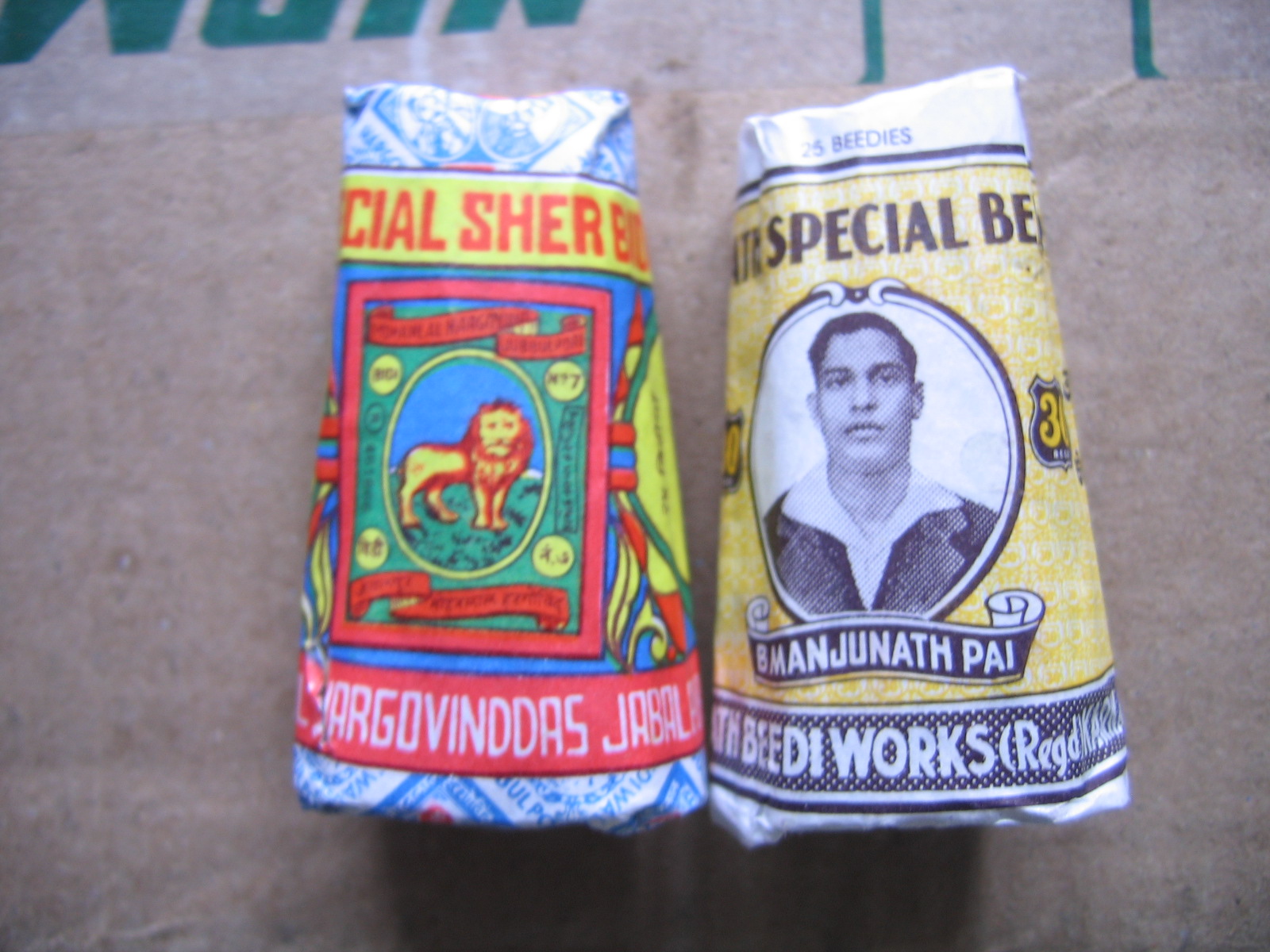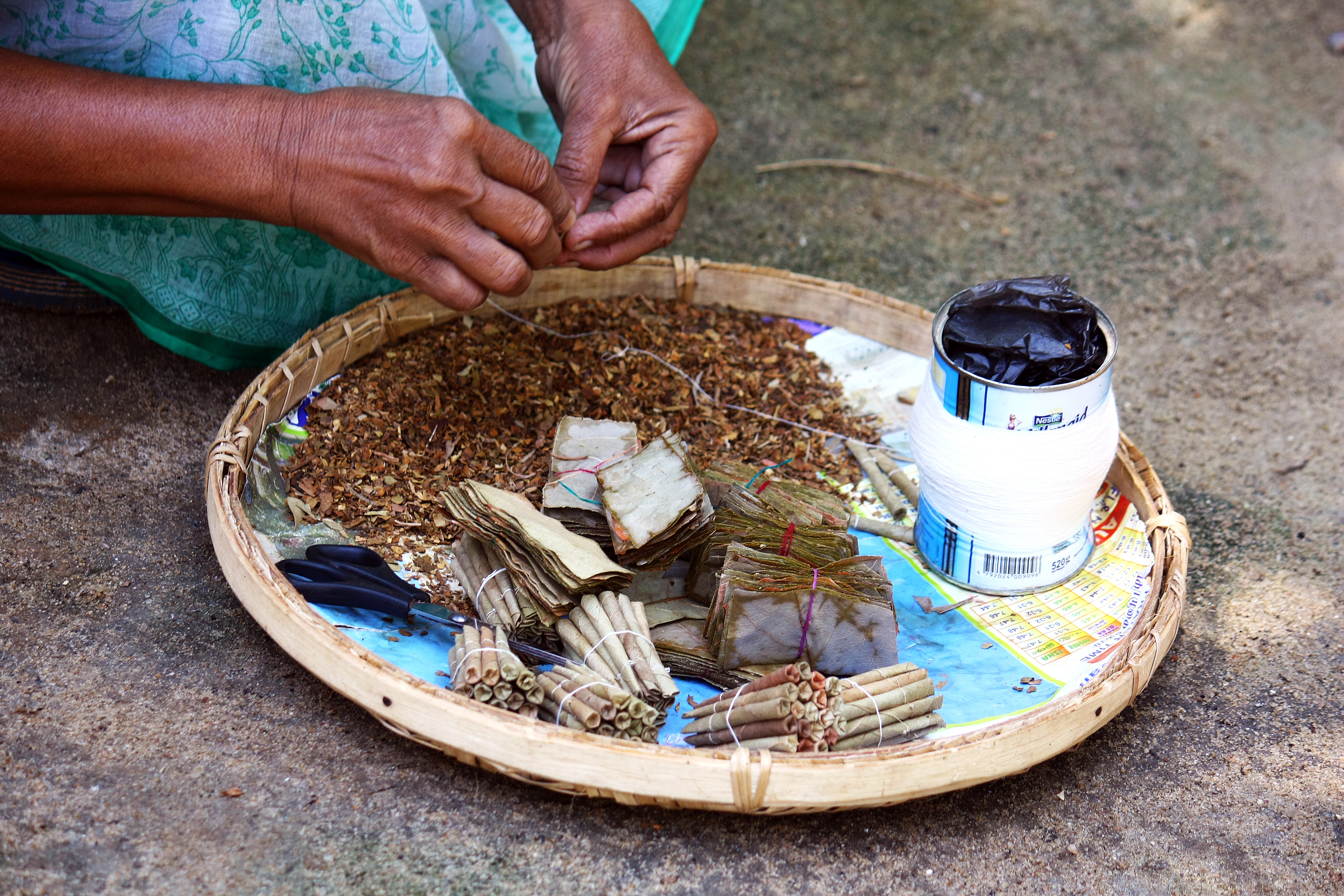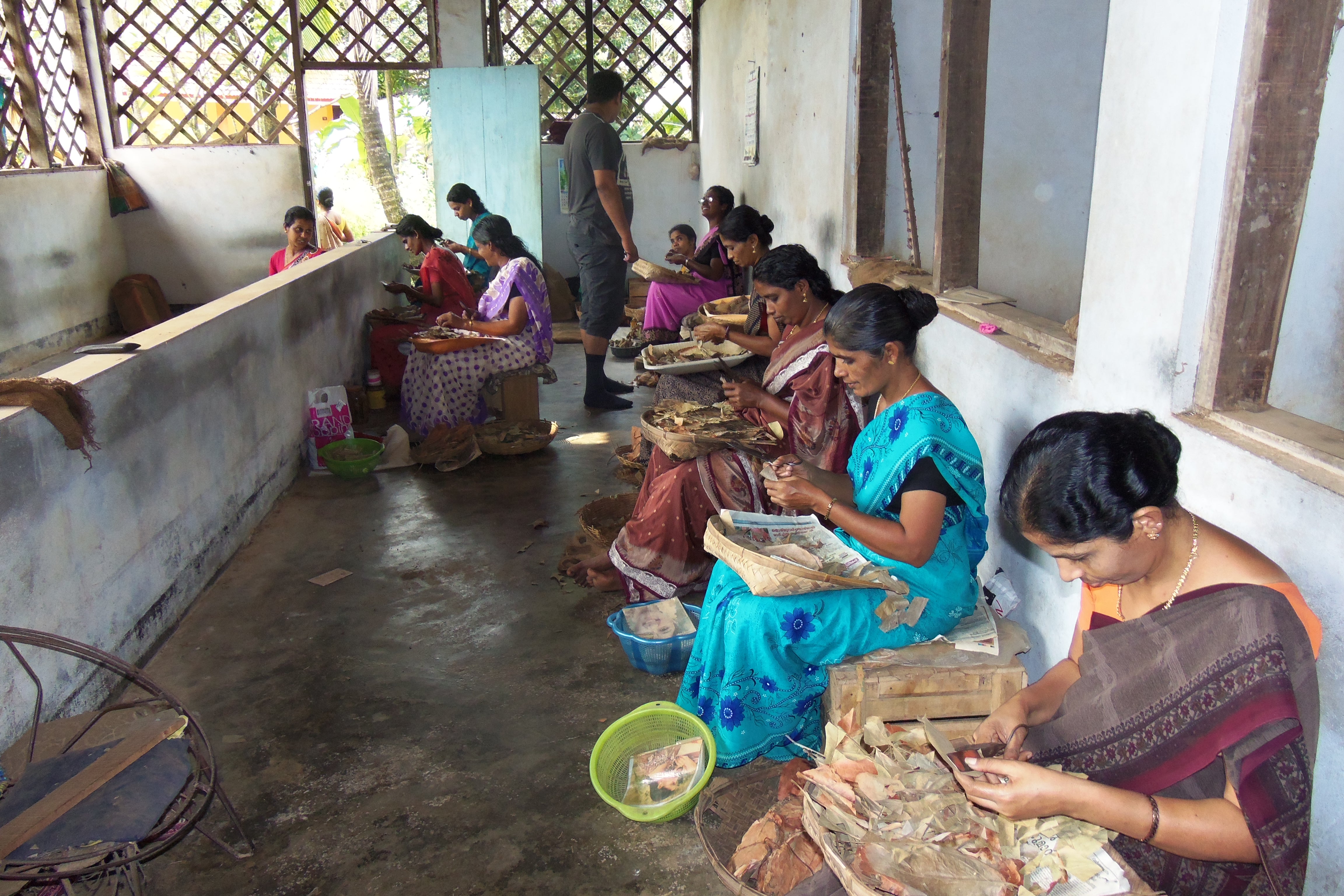Beedi on:
[Wikipedia]
[Google]
[Amazon]

 A beedi (also spelled bidi or biri) is a thin cigarette or mini-cigar filled with
A beedi (also spelled bidi or biri) is a thin cigarette or mini-cigar filled with
 Over 3 million Indians are employed in the manufacture of beedies, a cottage industry that is typically done by women in their homes. Analysis of bidi industry in India found that in spite of increase in profits worker wages declined and female workers were paid substantially less than male workers.
Workers roll an average of 500–1000 beedies per day, handling of tobacco flake. Handling tobacco and inhaling its dust is an occupational hazard for beedi workers as an increased level of chromosome aberrations was found in a scientific study.
The production of beedies is also popular in
Over 3 million Indians are employed in the manufacture of beedies, a cottage industry that is typically done by women in their homes. Analysis of bidi industry in India found that in spite of increase in profits worker wages declined and female workers were paid substantially less than male workers.
Workers roll an average of 500–1000 beedies per day, handling of tobacco flake. Handling tobacco and inhaling its dust is an occupational hazard for beedi workers as an increased level of chromosome aberrations was found in a scientific study.
The production of beedies is also popular in 
Action Plan for Beedi Women Workers
The

 A beedi (also spelled bidi or biri) is a thin cigarette or mini-cigar filled with
A beedi (also spelled bidi or biri) is a thin cigarette or mini-cigar filled with tobacco
Tobacco is the common name of several plants in the genus '' Nicotiana'' of the family Solanaceae, and the general term for any product prepared from the cured leaves of these plants. More than 70 species of tobacco are known, but the ...
flake and commonly wrapped in a tendu (''Diospyros melanoxylon
''Diospyros melanoxylon'', the Coromandel ebony or East Indian ebony, is a species of flowering tree in the family Ebenaceae native to India and Sri Lanka; it has a hard, dry bark. Its common name derives from Coromandel, the coast of southeas ...
'') or ''Piliostigma racemosum
''Bauhinia racemosa'', commonly known as the bidi leaf tree, is a rare medicinal species of flowering shrub with religious significance. It is a small crooked tree with drooping branches that grows tall and flowers between February and May. It i ...
'' leaf tied with a string or adhesive at one end. It originates from the Indian subcontinent
The Indian subcontinent is a list of the physiographic regions of the world, physiographical region in United Nations geoscheme for Asia#Southern Asia, Southern Asia. It is situated on the Indian Plate, projecting southwards into the Indian O ...
. The name is derived from the Marwar
Marwar (also called Jodhpur region) is a region of western Rajasthan state in North Western India. It lies partly in the Thar Desert. The word 'maru' is Sanskrit for desert. In Rajasthani languages, "wad" means a particular area. English tra ...
i word ''beeda''—a mixture of betel nuts
The betel (''Piper betle'') is a vine of the family Piperaceae, which includes pepper and kava. The betel plant is native to Southeast Asia. It is an evergreen, dioecious perennial, with glossy heart-shaped leaves and white catkins. Betel p ...
, herbs, and spices wrapped in a leaf. It is a traditional method of tobacco use throughout South Asia and parts of the Middle East, where beedies are popular and inexpensive. In India
India, officially the Republic of India (Hindi: ), is a country in South Asia. It is the seventh-largest country by area, the second-most populous country, and the most populous democracy in the world. Bounded by the Indian Ocean on the so ...
, beedi consumption outpaces conventional cigarettes accounting for 48% of all Indian tobacco consumption in 2008.
History
Beedies were invented after Indian tobacco cultivation began in the late 17th century. Tobacco workers were the first to create them by taking leftover tobacco and rolling it in leaves. The commercial Indian beedi industry saw rapid growth during the 1930s probably driven by an expansion of tobacco cultivation at the time but also helped byGandhi
Mohandas Karamchand Gandhi (; ; 2 October 1869 – 30 January 1948), popularly known as Mahatma Gandhi, was an Indian lawyer, anti-colonial nationalist Quote: "... marks Gandhi as a hybrid cosmopolitan figure who transformed ... anti- ...
's support of Indian industry and Indian products. Perhaps due to this, educated classes in India grew to prefer beedies to cigarettes although this is no longer the case. Muslim leaders, calling cigarettes foreign products, have also endorsed beedies at times.
By the middle of the 20th century, beedi manufacture had grown into a highly competitive industry. This stage of commercial production—at the height of the beedi's popularity—saw the creation of many new beedi brands as well as beedi factories employing upwards of one hundred, primarily male, beedi rollers.
Factory-based beedi production declined as a result of increased regulation during the 1940s, '50s, and '60s, and beedi-making became a cottage industry with a home-based women workforce predominantly employed only in the beedi rolling. In contrast, males continue to be employed in other aspects of beedi production.
Beedi smoking tends to be associated with a lower social standing, and these tobacco-filled leaves are inexpensive when compared to regular cigarettes. Those with a high social standing who do smoke beedies often do so out of the public eye; however, the cultural trend is changing.
A few of the major beedi companies are Ganesh beedi, Kaja beedi, Taj Mahal Beedi and Laxmi Biri.
Manufacture
 Over 3 million Indians are employed in the manufacture of beedies, a cottage industry that is typically done by women in their homes. Analysis of bidi industry in India found that in spite of increase in profits worker wages declined and female workers were paid substantially less than male workers.
Workers roll an average of 500–1000 beedies per day, handling of tobacco flake. Handling tobacco and inhaling its dust is an occupational hazard for beedi workers as an increased level of chromosome aberrations was found in a scientific study.
The production of beedies is also popular in
Over 3 million Indians are employed in the manufacture of beedies, a cottage industry that is typically done by women in their homes. Analysis of bidi industry in India found that in spite of increase in profits worker wages declined and female workers were paid substantially less than male workers.
Workers roll an average of 500–1000 beedies per day, handling of tobacco flake. Handling tobacco and inhaling its dust is an occupational hazard for beedi workers as an increased level of chromosome aberrations was found in a scientific study.
The production of beedies is also popular in Bangladesh
Bangladesh (}, ), officially the People's Republic of Bangladesh, is a country in South Asia. It is the eighth-most populous country in the world, with a population exceeding 165 million people in an area of . Bangladesh is among the mos ...
. According to the 2014 ''List of Goods Produced by Child Labor or Forced Labor The ''List of Goods Produced by Child Labor or Forced Labor'' is an annual publication issued by the United States Government’s Bureau of International Labor Affairs at the U.S. Department of Labor. It has been published within the December 2014 D ...
'' published by the Bureau of International Labor Affairs
The Bureau of International Labor Affairs (ILAB) is an operating unit of the United States Department of Labor which manages the department's international responsibilities. According to its mission statement:
''“The Bureau of International La ...
, the informal sector in these countries employs underage children in the production of beedies "in response to consumer preferences".

Tendu leaf
Tendu (''Diospyros melanoxylon'') leaves make excellent wrappers, and the success of the beedi is due, in part, to this leaf. The leaves are in abundance shortly after the tobacco crop is cured and so are ready to be used in beedi manufacture. Collected in the summer and made into bundles, the leaves are dried in the sun for three to six days before being used as wrappers.Global popularity
Beedies, unlike cigarettes, must be drawn frequently to keep them lit, and doing so requires effort.North America
In the United States, beedies are treated like conventional cigarettes. They are taxed at the same rates, are required to have a tax stamp, and must carry the Surgeon General's warning. However, a study done in San Francisco showed that about four in ten packs of beedies did not contain the required warning label and seven in ten did not carry the tax stamp. 2006 statistics on beedi usage show that 2.9% of high school students in the United States take part in beedi smoking compared to 1.4% of those aged 18 to 24. Some beedies are flavoured. Both Canada and the US have banned flavoured cigarettes.United Kingdom
Beedis are currently legal in the UK and are subject to the same taxation as cigarettes. One must be aged 18 or over to purchase them.Health warnings
Beedies deliver morenicotine
Nicotine is a natural product, naturally produced alkaloid in the nightshade family of plants (most predominantly in tobacco and ''Duboisia hopwoodii'') and is widely used recreational drug use, recreationally as a stimulant and anxiolytic. As ...
, carbon monoxide
Carbon monoxide (chemical formula CO) is a colorless, poisonous, odorless, tasteless, flammable gas that is slightly less dense than air. Carbon monoxide consists of one carbon atom and one oxygen atom connected by a triple bond. It is the simple ...
, and tar
Tar is a dark brown or black viscous liquid of hydrocarbons and free carbon, obtained from a wide variety of organic materials through destructive distillation. Tar can be produced from coal, wood, petroleum, or peat. "a dark brown or black bi ...
and carry a greater risk of oral cancers than conventional cigarettes. As with many other types of smoking, beedies increase the risk of certain kinds of cancers, heart disease, and lung disease
The lungs are the primary organs of the respiratory system in humans and most other animals, including some snails and a small number of fish. In mammals and most other vertebrates, two lungs are located near the backbone on either side ...
. They may also be more harmful than other forms of tobacco consumption.
Frequency of ventilatory abnormalities was highest in the cigarette smokers. A lower prevalence of chronic bronchitis and abnormal ventilatory measurements in beedi smokers, as compared with cigarette smokers, was thought to be primarily due to low total consumption of tobacco. Some added influence of smoke produced by burning of the wrapper leaf and type of tobacco used in beedies could not be ruled out.
See also
*Paan
Betel nut chewing, also called betel quid chewing or areca nut chewing, is a practice in which areca nuts (also called "betel nuts") are chewed together with slaked lime and betel leaves for their stimulant and narcotic effects. The practice ...
*Gutka
Gutka, ghutka, guṭkha or betel quid is a chewing tobacco preparation made of crushed areca nut (also called betel nut), tobacco, catechu, paraffin wax, slaked lime (Calcium hydroxide) and sweet or savory flavourings, in India, Pakistan, other ...
References
External links
Action Plan for Beedi Women Workers
The
International Labor Office
The International Labour Organization (ILO) is a United Nations agency whose mandate is to advance social and economic justice by setting international labour standards. Founded in October 1919 under the League of Nations, it is the first and ol ...
Beedi
{{Social issues in India
Cigarette types
Tobacciana
Tobacco in India
Desi culture
Smoking in India